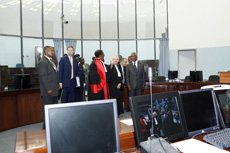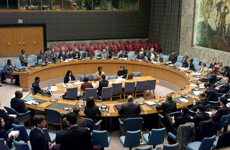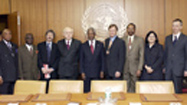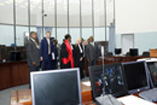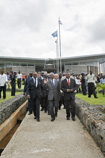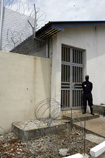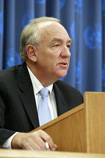|
Statute for the Special Court for Sierra Leone
Freetown, 16 January 2002
F o r t h c o m i n g
Introductory note to be published
On 9 August 2000, the President of Sierra Leone addressed a letter to the President of the Security Council requesting him to set up a special court for Sierra Leone in order to “try and bring to justice those members of the Revolutionary United Front and their accomplices responsible for committing crimes against the people of Sierra Leone and for the taking of United Nations peacekeepers as hostages”. Five days later, following consultations on the matter, the Security Council adopted resolution 1315 (2000), by which it requested the Secretary-General to negotiate an agreement with the Government of Sierra Leone. Pursuant to the aforementioned resolution, the Secretary-General subsequently submitted a report to the Security Council which outlined the nature and specificity of the proposed special court, its competence and organizational structure, as well as other procedural issues. A draft agreement and an enclosed draft statute for the special court were also annexed to the report. On 22 December 2000, the President of the Council sent a letter to the Secretary-General containing suggestions of amendments to the draft agreement and statute from the members of the Council. On 16 January 2002, the Agreement on the Establishment of the Special Court was signed. The Agreement contains 23 articles which, inter alia, provide for: the establishment and composition of the Special Court and appointments of judges, prosecutors and a Registrar (articles 1-4); premises, expenses and funds (articles 5-6 and 8-9); the seat of the Special Court and its juridical capacity (articles 10-11); privileges and immunities (articles 12-13); counsel, witnesses and experts as well as the security, safety and protection of persons referred to in the Agreement (articles 14-16); the Government’s cooperation with the Special Court (article 17); the working language of the Special Court (article 18); and practical arrangements and procedural issues relating to, inter alia, the entry into force and termination of the Agreement (articles 19-23). The Court formally began to operate on 1 July 2002. Eight judges of the Court were sworn in on 2 December 2002, and the first indictments were issued by the Office of the Prosecutor on 10 March 2003.
On 14 August 2000, following consultations on the matter, the Security Council adopted resolution 1315 (2000), by which it requested the Secretary-General to negotiate an agreement with the Government of Sierra Leone to create an independent special court. The Council recommended that the special court’s subject matter jurisdiction should include notably crimes against humanity, war crimes and other serious violations of international humanitarian law, as well as crimes under relevant Sierra Leonean law committed within the territory of Sierra Leone. It further recommended that the special court should have personal jurisdiction over persons who bear the greatest responsibility for the commission of the above crimes, including those leaders who, in committing such crimes, had threatened the establishment of and implementation of the peace process in Sierra Leone. On 4 October 2000, the Secretary-General submitted a report to the Security Council pursuant to resolution 1315 (2000) (S/2000/915), which outlined the nature and specificity of the proposed “Special Court”, its competence and organizational structure, as well as issues such as the enforcement of sentences in third States, a possible alternative seat for the special court, practical arrangements for its operation and financing mechanisms. A draft “Agreement between the United Nations and the Government of Sierra Leone on the Establishment of a Special Court for Sierra Leone” and an enclosed draft statute for the special court were annexed to the report. On 22 December 2000, following the Security Council’s review of this report, the President of the Council sent a letter to the Secretary-General containing suggestions for amendments to the draft agreement and statute from the members of the Council, relating to the personal jurisdiction, funding and size of the special court (S/2000/1234). Following bilateral negotiations, the Agreement between the United Nations and the Government of Sierra Leone on the Establishment of a Special Court for Sierra Leone, with the Statute of the Court annexed thereto, was signed in Freetown, Sierra Leone, on 16 January 2002. The Agreement entered into force, in accordance with its article 21, on 12 April 2002, following its ratification by Sierra Leone. Article 6 of the Agreement provided that “the expenses of the Court shall be born by voluntary contributions from the international community”. The Court formally began to operate on 1 July 2002, when the Secretary-General had sufficient contributions to finance the establishment of the Court and twelve months of its operation, as well as pledges amounting to the anticipated expenses for the following twenty-four months of the Court’s operation. Eight judges of the Court were sworn in on 2 December 2002, and the first indictments were issued by the Office of the Prosecutor on 10 March 2003. Related Documents Letter dated 9 August 2000 from the Permanent Representative of Sierra Leone to the United Nations addressed to the President of the Security Council (S/2000/786)
|
|||||||||||||||||||||||||||||||||||||||

